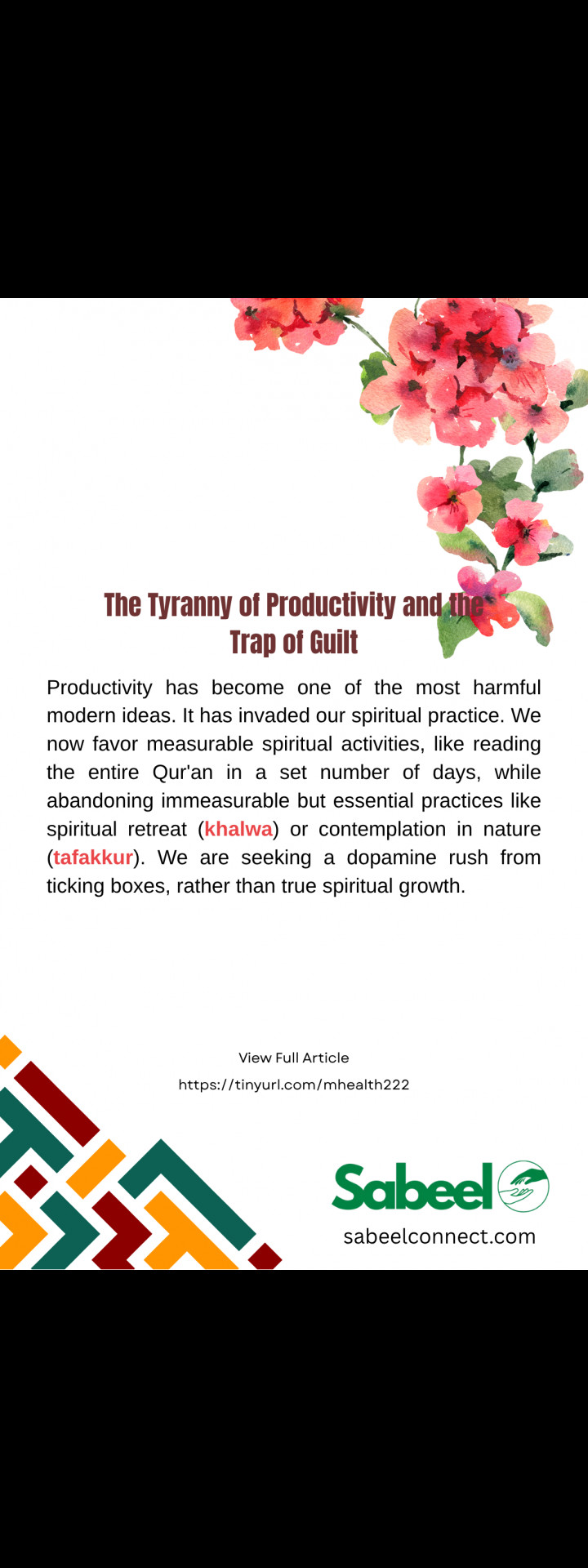In a special taster session for the Blogging Theology Academy's upcoming diploma in Islamic Psychology, renowned neuroscientist and theologian Dr. Franchesa Bocker offered profound insights into one of the modern world's most pervasive challenges: burnout. This pioneering program, launching its second year in January 2026, promises a deep dive into the remedies and pathways to well-being rooted in Islamic tradition. Dr. Bocker, who holds a PhD in systemic neuroscience and a diploma in Islamic psychology, explains how this tradition offers a powerful and holistic framework for understanding, preventing, and curing burnout.
What is Burnout? More Than Just a Feeling
Exhaustion or energy depletion. Mental distance or cynicism towards one's work. A reduction in professional efficacy and productivity.
The Modern Malady: Why Did Burnout Emerge Now?
Byung-Chul Han , inThe Burnout Society (2010), argues that our societal setting is the cause. We are told from a young age that "nothing is impossible." This creates an environment where everyone is an entrepreneur of the self, constantly trying to optimize, upgrade, and perform. This relentless pressure is toxic.Charles Taylor , inA Secular Age , points to the "disenchantment" of the modern world. Modernity has stripped away transcendence, religious structure, and sacredness, leaving a linear, commodified, and empty landscape. In this economic-focused reality, there is never enough, and we must always achieve more because meaning is not readily available.Mark Fisher , inCapitalist Realism , explains that in a neoliberal ideology, suffering is framed as a personal failure. Instead of seeing a systemic malfunction, the individual internalizes the problem, thinking, "I am not productive enough; I need to hustle harder." The collapse of solidarity and the rise of competition make people vulnerable to self-blame, anxiety, and ultimately, burnout.
The Limits of Conventional Cures
CBT focuses on identifying negative thought patterns, improving time management, and setting boundaries. However, this can further isolate the individual and create an illusion of total control, placing the full burden of change on them.Mindfulness emphasizes breathing, body awareness, and being in the present moment. The problem is that people often seek a meaning that transcends the present. This body-first approach is a product of a secular, materialistic worldview that assumes humans are autonomous, rational individuals driven by productivity—assumptions that can and should be questioned.
Historical Wisdom: Islamic Scholars on Exhaustion
Abu Zayd al-Balkhi (9th century) spoke offutur , or psychological exhaustion, resulting from prolonged sadness or anxiety. He identified the direct link between emotional strain and the loss of physical vitality.Ibn Sina (Avicenna) , in his famousAl-Qanun fi al-Tibb (The Canon of Medicine), discussed mental exhaustion and melancholia. He described a specific mental fatigue arising from prolonged stress, sadness, or intense intellectual work, with symptoms like loss of appetite, sleep disturbances, and reduced motivation. Critically, he warned that without rest, lifestyle changes, andjoy-inducing activities (like poetry, nature walks, and good companionship), these states could lead to deeper depression and a collapse of the self's inner strength. He stressed the importance of moderation in study and even in religious observances.Al-Razi (Rhazes) noted that chronic stress and emotional dysregulation could induce conditions likehuzn (sadness) andwahn (weakness of the heart), leading to digestive problems and muscle fatigue. He recognized both emotional and moral causes, such as financial pressure or a lack of spiritual grounding.Al-Majusi (Haly Abbas) described a "waning in the faculties" caused by prolonged emotional agitation or intense administrative stress, which throws the body's humors out of balance and leads to exhaustion.
The Islamic Framework: Burnout as a Symptom of Imbalance
The Islamic Cure: A Multi-Pronged Approach to Healing
Prevention: Building a Life of Balance and Variety
Maintaining Balance ( Living a balanced, proportioned life is the first line of defense.Wasatiyyah ):Accepting Life's Rhythms: A core belief is that life has ups and downs. A hadith reminds us that "for everything there is a zeal, and for every zeal there is a slackening." These natural cycles—daily for men, monthly for women—should be honored, not fought against.Internal Harmony ( This is about creating harmony between our different inner faculties—our emotional, appetitive, and intellectual selves. We cannot live permanently in just one of these spheres.I'tidal ):The Right to Rest: Rest is a daily requirement. The prophetic habit of the midday nap (qaylulah ), largely lost in the modern 8-to-5 workday, is a vital tool for rejuvenation.A Life of Variety: We are not meant to live monotonous lives. The Prophet ﷺ gently rebuked companions who prayed all night, reminding them, "Your eyes have a right over you. Your body has a right over you. Your family has a right over you." These rights are sources of joy.
The Tyranny of Productivity and the Trap of Guilt
Final Advice for Today's Muslims
Don't Be Afraid to Change. Look at the example of Imam al-Ghazali, who left his high-performing life when he felt spiritually constricted. His courageous change led to one of the greatest renewals in Islamic thought.Live a Light Lifestyle. Our scholars owned few clothes and ate little, not just as an aesthetic of asceticism (zuhd ), but as a protective measure for their mental health. The less you need, the less you will stress.Learn to Set Boundaries. Ask yourself, "Has Allah given me the strength for this?" If not, it is not your responsibility. We are not asked to do what we cannot. A deep acceptance of destiny (qadr ) helps in setting these healthy boundaries without guilt.Internalize Life's Reality. Work is meant to be hard. The world (dunya ) is meant to be difficult. Work is a means to provide for your family; it is not the source of your ultimate meaning, happiness, or value.





Leave a Reply